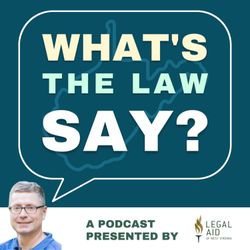Latest episode

42. 42 - Utility Issues in WV with the Public Service Commission
29:54||Ep. 42In this episode of What's the Law Say? Clint talks with Karen Macon of the Public Service Commission about utility regulation and customer rights and services that the PSC can provide for utilities customers to assist in resolving complaints about public utilities such as water, electric, or gas. What does the PSC have in place to help customers who are having problems? Get some answers as we discuss consumer rights, such as reasonable payment arrangements, as well as the hearing process within the PSC including informal and formal complaints.
More episodes
View all episodes

41. 41 - Free Online Legal Tools
30:00||Ep. 41In this episode of What's the Law Say? Clint chats with Dane Henry, Advocacy, Training and Technology Attorney at Legal Aid of West Virginia. They discuss tools available to the public online to assist with legal issues. These resources include final products like drafted court documents and letters to opposing parties. There are also tools designed to assess legal claims through technology like the Kinship Connector and the Renter's Rights WV resources available on LAWV's website.
40. 40 - The WV Innocence Project at WVU College of Law
29:48||Ep. 40In this episode of What's the Law Say, Clint visits with Melissa Giggenbach from the WV Innocence Project, a clinic of WVU College of Law. They discuss the work of the Innocence project: how they identify cases that qualify for their assistance and how they are able to seek relief for people who have been convicted and incarcerated for crimes that they did not commit. Melissa and Clint talk about the Writ of Habeas Corpus and other options for people who have been convicted. Learn more about the WV Innocence Project at https://wvinnocenceproject.law.wvu.edu/.
39. 39 - Criminal Law in West Virginia: Part 2
29:50||Ep. 39This is Part 2 of Clint's discussion with Dana Eddy, Executive Director of Public Defender Services. In this episode, Clint and Dana discuss the plea bargaining process, criminal trial, pre-trial diversion programs, sentencing and other issues impacting criminal defendants. Clint and Dana also talk about the impact of defendants who have mental illness and are otherwise unable to stand trial.
38. 38 - Criminal Law in West Virginia: Part 1
33:02||Ep. 38In part 1 of this episode, Clint talks with Dana Eddy, Executive Director of Public Defender Services. Clint and Dana talk about the pretrial procedure in criminal law. This episode is part 1 of a 2 part focus on criminal law in the State of West Virginia. Clint and Dana discuss and provide an overview of the pre-trial process including arrest warrants, indictments and what is needed to post bond as well as the services provided by the public defenders.
37. 37 - Employee Rights in West Virginia
30:08||Ep. 37In this edition of What's the Law Say?, Clint visits with pro bono attorney Walt Auvil to discuss employment law. They talk through things that are illegal for an employer to do and outline what rights an employee has. Clint and Walt talk about the rights and obligations of employees and employers and discuss numerous ways an employee can enforce their rights including the department of labor, the human rights commission, a grievance procedure or civil litigation.
36. 36 - Unemployment in West Virginia
29:52||Ep. 36In this episode of What's the Law Say, Clint talks with Wheeling Attorney Andrew Beatty about unemployment compensation benefits. They talk about who is eligible for unemployment, actions that can make an employee ineligible, and how the process works when you apply for unemployment benefits including the initial deputy decisions, the hearing before an Administrative Law Judge, and appeal options available to the employee and the employer. Clint also makes goofy jokes. As always, if you need more help with this issue, please apply for help from Legal Aid of WV by calling 866-255-4370, or you can learn more at www.legalaidwv.org.